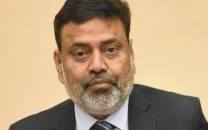‘Iddat must for convert marrying Muslim man’
SHC rules a woman convert can file for marriage dissolution only if her husband declines to embrace Islam

In a seminal judgment, the Sindh High Court (SHC) Hyderabad Bench on Friday declared it mandatory for a non-Muslim woman remarrying a Muslim man after converting to Islam to observe the 90-day iddat period.
AS per Shariah, iddat is a period of seclusion a woman passes after divorce or death of her husband.
The judgment, authored by Justice Muhammad Iqbal Kalhoro of SHC's Hyderabad bench, also ruled that a woman convert will have to invite her non-Muslim husband to embrace Islam and file a petition for dissolution of marriage in a family court.
The verdict was given on a petition filed by Lalu Tamachi whose wife Nagina, who bore him four children, converted to Islam and tied the nuptial knot with Mazhar Hussain Khan. "Iddat is necessary after the dissolution of marriage of any character," the bench ruled.
The order explained that the twin causes of iddat were to offer an opportunity to a non-Muslim husband of a woman convert to embrace Islam and also to see if the woman is or becomes pregnant from her former husband.
"If the husband in response to [the] offer embraces Islam within the period of iddat, the marriage shall continue. But if he remains non-Muslim even after [the] expiry of iddat, [then] the court may pass a decree of termination of the marriage," reads the judgment.
The woman convert is supposed to file a petition in a family court which will summon her husband to give him the opportunity to change his religion following in the footsteps of his wife. The court will wait till the expiry of iddat before decreeing the termination.
The court referred to a 1997 litigation in the Lahore High Court in which the petitioner, a Christian by faith, had challenge the marriage of his wife with a Muslim man. The LHC had engaged three amicus curiae, including Maulana Abdul Qadir Azad, Muhamamd Ismail Qureshi and Advocate Abid Hassan Minto. The emphasis was laid on the question of observing iddat.
Azad replied to the court that a woman after embracing Islam should invite her husband to follow suit. The marriage will become dissolved if the husband refuses. Subsequently, the woman will observe a mandatory 90-day iddat before remarrying a Muslim man.
Qureshi wrote to the LHC that a marriage solemnized during iddat would be considered Fasid [irregular] but not Batil [void]. The irregular marriage would have to be regularized through a fresh Nikkah after completion of iddat.
Minto while partly reiterating the same stance of Azad said the dissolution of marriage should take place before a judge. "Iddat is imposed to ascertain whether the woman is pregnant from her previous husband so as to avoid confusion of parentage," Minto wrote. He doubted that any criminal liability arose from Fasid [irregular] marriage.
On the basis of input from those jurists as well as similar previous cases, the LHC concluded its order with three points. The first pertained to informing the husband about conversion of faith followed by inviting him to accept Islam. The third is mandatory observance of iddat for three months or 90 days.
The LHC had also referred to Syed Ameer Ali's book Muhammadan Law in which he has stated that in a non-Islamic country, a non-Muslim woman converting to Islam should wait for three menstrual cycles before her marriage could be dissolved.
The court directed the SHC's Registrar to circulate the order to the judges of all the district and civil courts besides sending it to the Sindh cabinet which may consider appropriate legislation.
Tamachi's case
In the instant case, Nagina left house of her husband on January 15, 2022, and two days later on January 17 she converted to Islam. The SHC noted that there is no evidence to suggest that she had apprised her former husband of her conversion plan.
The bench also observed that the affidavit submitted by the woman in which she claims inviting her husband to Islam was written in English. Yet, neither the woman nor her ex-husband can read or understand English. She appeared clueless about the content of the affidavit when she was asked in the courtroom.
"There is no evidence that she ever happened to meet with the petitioner [Tamachi] and made him offer [to embrace Islam]," the judge stated. The woman also did not observe iddat.
The bench then raised the question about the status of Murk's conversion and marriage because she failed to comply with all procedures laid down in the law. However, the judge quickly referred to the LHC's order and opinion of the amicus curiae which did not declare any criminal liability and offered the salutation of a fresh nikkah after completion of iddat.
"Unfortunately, the recommendations of the apex court have fallen on deaf ears and so far no legislation on such lines has ever been considered," reads the judgment. Nevertheless, the bench said, the Sindh Assembly has taken the first step in this regard by passing the Hindu Marriage Act, 2018. Section 11 of the Act provides for termination of marriage by a family court. Yet many questions remain unanswered in the Act, the court said.
Published in The Express Tribune, October 1st, 2022.



















COMMENTS
Comments are moderated and generally will be posted if they are on-topic and not abusive.
For more information, please see our Comments FAQ